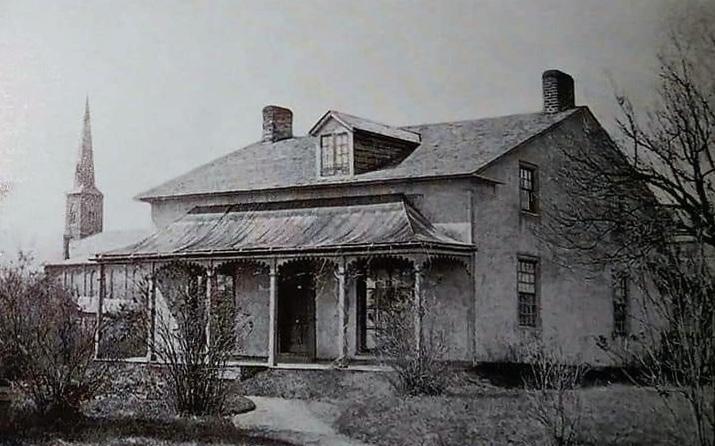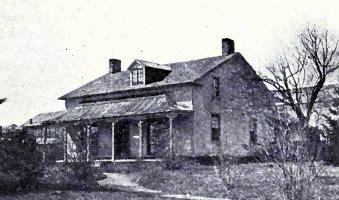
4 minute read
The Indian Village, The Indian Department, and Missionaries: A Brief History of Early Orillia Settlement
from Winter 2023 Mzinigan
by bencousineau

Yellowhead’s Island Sept. 15th 1830
Advertisement
(a letter from Yellowhead to Lieutenant Governor Sir John Colborne)
Father, Seven young men belonging to this tribe and perhaps some of the Snake tribe will settle on the portage road from this to Majedusk next spring. As for us old men, we intend to settle at the village you are building for us and end our days there; our children will be kept at school. Father, We are always grateful to receive your instructions and ready to obey them, but it is getting so late in the season, we shall not be able to clear much this fall, but early next spring we will commence as you desired us. Father, We are poor yet and have no mockasins, we wish to hunt this fall and get some deer skins against the cold weather.
Father, We are glad of the money you sent us for our work this season, and we wish to know when you can pay us the remainder. We shall be going to our huntings in about two weeks and should be glad of the money before we go and if you can accomodate us we should be glad of some small change in such as three, two, and one dollar bills with some 2/6 pieces. We are your children.
William Yellowhead x Bigwin x Watumbone Yongs x Isaac Johns x Big Shilling x
Indian Department, Coldwater, 28 December 1830
Sir: A short time since I had the honour to report to you that Mr. Alley had commenced Keeping School at the Narrows; at this time the Indians were encamped about their New Village and the Methodist Teachers had not come away from Yellow Head’s Island, however as soon as Mr. Law the teacher could come over he did, and, in a bark wigwam, commenced Keeping School, and the Indian children apparently contrary to their wishes, left Mr. Alley who is in a subsequent conversation with Mr. Law received almost unqualified abuse.
On the 24th inst. I considered it necessary to know from Yellow Head whether he intended that any of their children should attend our school or not, and in presence of several other Indians I asked him the simple question, observing that I did not make use of persuasive language but merely wished to have their decision, for if they did not intend to send them to be taught by the Master their Father had sent to them for that purpose the would go to Coldwater and Keep School there. The Indians seemed quite satisfied that it would be the best plan to send part of their children to our school, still there appeared a delicacy or fear to give a positive and immediate answer, I said there was no secret in the queston I had asked them and as I wished for a deliberate reply, it would be better for them to wait until monday and in the meantime if they concluded to allow part of their boys and girls to attend Mr. Alley, it might be well, as we did not wish to have the choice of his scholars to consult Mr. Law as to which ones he would recommend giving up, and that it was not their Father’s wish in any wise to interfere with their
Teachers at this station further than to assist in bringing the children forward as fast as possible.
On Monday, being the day appointed to receive their answer, Mr. Alley went to where the Indians were in consultation with the Methodist Minister and the Teacher; On Mr. Alley’s explaining the object of his visit poor Yellow Head was so confounded from the desire of displeasing Mr. Allison (the minister) that the perspiration rolled from his face and finally he could not say anything satisfactory on one side or the other, and put off his answer until he could see his father at York.
In the meantime, Mr. Alley was loaded with gross abuse by the Minister with which he appears to have submitted, with patience and great forbearance, but as it appears highly necessary that this business, as well as Mr. Lewis’ affairs should be more fully explained by letter, I have requested Mr. Alley to be the brain of this and other dispatches for His Excellency’s information and beg permission to refer to him for further particulars.
I have the honour to be Sir, Your Most Obedient and Humble Servant
T. G. Anderson
Indian Department, Coldwater, 19 March, 1831
To Colonel J. Givens
Sir: In compliance with the direction received from His Excellency, Yellow Head pointed out a spot of ground for the Methodists to build on but they have changed their plan and insist upon building in another place and occupying a large parcel of land which the Indians do not at all approve of, and desire me to request that His Excellency will be pleased to name the spot and quantity allowed to them.
T. G.Anderson, Superintendent, Indian Department
Indian Department, Coldwater, 7 April 1831
To Colonel J. Givins
Sir: I have the honour to report for you for the information of His Excellency the Lt. Governor that in obedience to that part of Asst. Commr. Genl. Foote letter of the 30th Ult. relative to the Methodist buildings, I have seen Mr. Allison the preacher on the subject who informs me his object is to build a two story log house 34 by 28 feet intended for dwelling for the members of the Missionary family. The spot which Mr. Allison would prefer is immediately adjoining the south end of Yellowhead’s village and he also wishes, in front of the building, to have a garden and potato field extending along Shingle Bay Road and down to Lake Simcoe containing from three to ten acres. Mr. Allison wishes to be informed whether he or the society to which he belongs, will receive a lease or other grant of the ground which they may be allowed to occupy.
The Chief Yellowhead being from home on a hunting excursion, I could not consult him on this subject, but have no doubt it should meet His Excellency’s approbation he will be satisfied with it.
Mr. Allison has all the timber prepared for the house and begs that he may be favoured with an early answer, in order that he may proceed with his building. The Methodist Minster (Mr. Currie) of Matchedash has also requested of me to beg His Excellency’s permission to occupy a piece of ground at Coldwater, for the same purpose as required by Mr. Allison at the Narrows.
I have the honour, Sir, to be Your Most Obdt. Hble. Servt.
T. G.Anderson, S.I.A.
Unfortunately, the chain of correspondence trails off there, at least in terms of digitized and accessible proof. There isn’t a steady stream of letters culminating in the result which we know of today.









